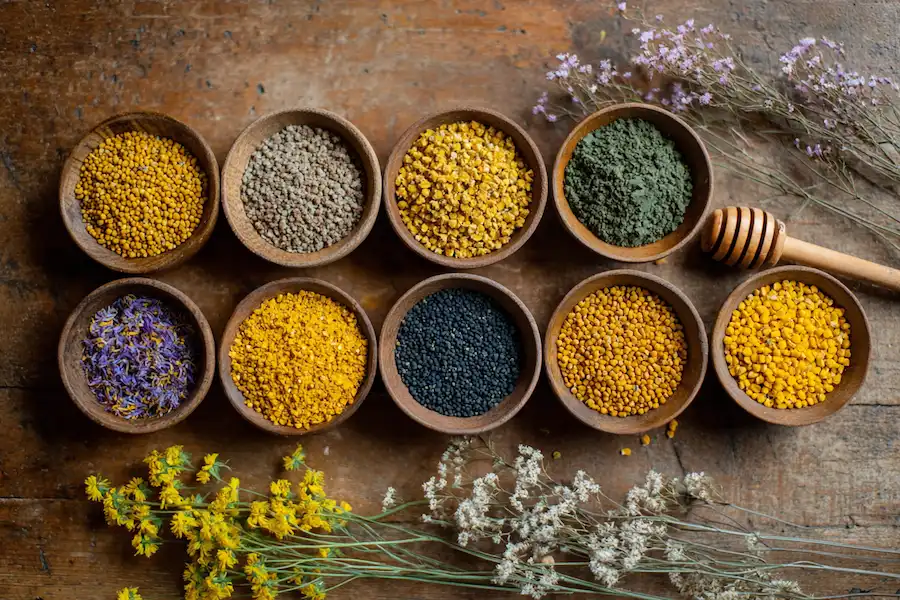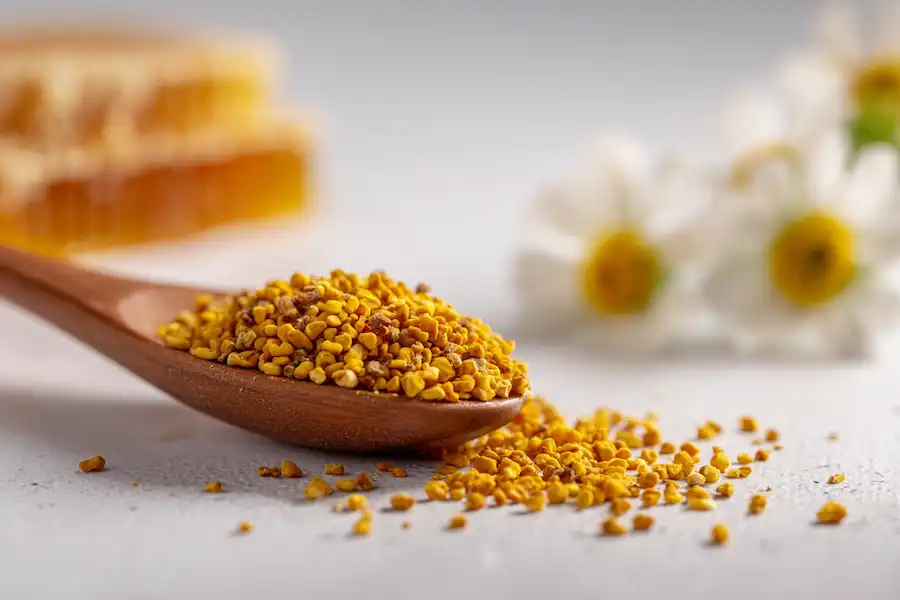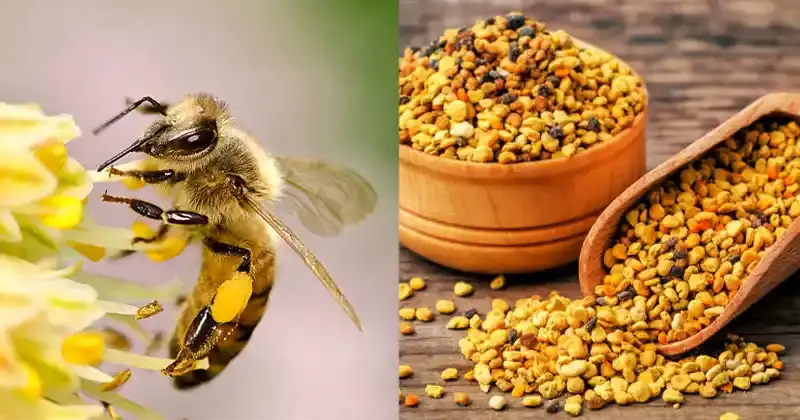Raw bee pollen has been treasured for centuries as one of nature’s most complete and energizing foods. Each tiny granule is packed with proteins, vitamins, minerals, enzymes, and antioxidants. What makes raw bee pollen even more fascinating is that its nutritional and healing properties vary depending on the plants from which bees collect it. Different flowers give bee pollen distinct qualities, making each type beneficial in unique ways.
Below are some of the most common and powerful types of raw bee pollen, each with their standout benefits.
1. Clover Bee Pollen
Clover is one of the most widespread plants, and bees often gather its pollen in abundance.
Key Benefits of Clover Bee Pollen:
- Boosts energy levels thanks to natural sugars and B vitamins.
- Supports heart health by helping to balance cholesterol.
- Rich in antioxidants, protecting cells against free radical damage.
- Aids digestion through natural enzymes that improve nutrient absorption.
- Strengthens immunity with plant-based compounds that guard against infections.
2. Wildflower Bee Pollen
This type is collected from a wide variety of wildflowers, offering a diverse nutrient profile.
Key Benefits of Wildflower Bee Pollen:
- Helps with seasonal allergies by gradually desensitizing the body to pollen.
- Supports healthy metabolism with a balanced mix of proteins and amino acids.
- Improves skin health through vitamins A, C, and E.
- Promotes liver detoxification by flushing out toxins.
- Enhances stamina and recovery, making it a favorite for athletes.
- Boosts fertility by improving hormone balance naturally.
3. Buckwheat Bee Pollen
Buckwheat pollen is dark and strong in taste, but it is among the richest in antioxidants.
Key Benefits of Buckwheat Bee Pollen:
- Powerful antioxidant effects that protect against premature aging.
- Improves blood circulation and strengthens blood vessels.
- Supports respiratory health, easing symptoms of asthma and cough.
- Helps with wound healing due to high rutin content.
- Promotes heart health by lowering blood pressure naturally.
4. Pine Bee Pollen
Collected from pine trees, this pollen is very different from flower pollen and often considered a tonic for male vitality.
Key Benefits of Pine Bee Pollen:
- Supports testosterone levels and male reproductive health.
- Boosts energy and endurance, helping with physical performance.
- Enhances brain function with its unique plant sterols.
- Strengthens immunity against viral and bacterial infections.
- Promotes joint health with natural anti-inflammatory compounds.

5. Sunflower Bee Pollen
Sunflowers provide a bright, golden pollen that is nutrient-rich and easy to recognize.
Key Benefits of Sunflower Bee Pollen:
- Strengthens the immune system through high zinc content.
- Supports skin and hair health with vitamin E and essential fatty acids.
- Improves mood by supporting serotonin balance.
- Protects eye health thanks to lutein and zeaxanthin.
- Boosts metabolism by stimulating fat and carbohydrate breakdown.
6. Eucalyptus Bee Pollen
Collected from eucalyptus blossoms, this pollen has unique medicinal qualities.
Key Benefits of Eucalyptus Bee Pollen:
- Supports respiratory health, easing congestion and breathing problems.
- Acts as a natural antibacterial, helping the body fight infections.
- Relieves inflammation, useful for arthritis or chronic pain.
- Boosts immune defenses against seasonal illnesses.
- Promotes oral health by reducing harmful bacteria in the mouth.
7. Acacia Bee Pollen
Acacia flowers are delicate and sweet, and their pollen reflects the same qualities.
Key Benefits of Acacia Bee Pollen:
- Gentle on digestion, making it ideal for sensitive stomachs.
- Provides steady energy without spikes in blood sugar.
- Rich in minerals like potassium and magnesium for heart health.
- Supports emotional balance, reducing stress and anxiety.
- Improves blood sugar regulation, helpful for those monitoring glucose levels.
While these seven are among the most popular and widely appreciated, it’s important to know that there are many more types of raw bee pollen, each with their own unique properties. For example, willow pollen is praised for its rich carotenoids that support eye and skin health, wild rose (rosehip) pollen is valued for digestive balance and high vitamin C content, chestnut pollen is known for its strong antioxidant profile and circulation benefits, and plum pollen offers minerals that nourish the nervous system. Depending on the plants available in a region, bee pollen can vary greatly in color, taste, and nutritional value, which means nature provides an incredible diversity of “golden little nuggets” with endless wellness potential.
Raw bee pollen is not just a single “superfood”—it’s a collection of nature’s finest medicines, each variety reflecting the power of the plant it comes from. Whether it’s clover for energy, buckwheat for antioxidants, or pine for vitality, every type of bee pollen offers something unique.

Disclaimer: Bee pollen is a natural powerhouse, but it may cause allergic reactions in sensitive individuals, especially those allergic to bee stings or pollen. Always start with small amounts and consult with a healthcare professional before adding it to your diet, especially if you are pregnant, nursing, or have chronic conditions.
Inspired by this? Share the article with your friends!
